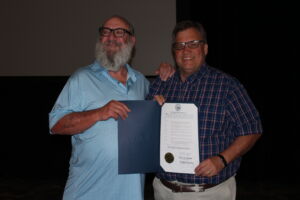Ted’s talk: Revered rural mental health specialist talks career, farm stress
Ted’s talk: Revered rural mental health specialist talks career, farm stress

This article ran as the cover story in the September-October 2025 issue of Soybean Business. Click here to read the digital issue.
Minnesota’s agriculture community might be small, but Ted Matthews’ name looms large, even when it’s flown under the radar. Mental health professionals typically don’t seek the spotlight. While the farm families he’s assisted through tough times goes undocumented, the breadth of farmers Matthews has counseled through free, confidential services is countless.
Farmers trust Ted and his straight-talk approach to discussing depression, PTSD and domestic abuse. He’s earned their confidence.
“Ted’s impact on rural mental health in Minnesota can’t be overstated,” Minnesota Department of Agriculture (MDA) Commissioner Thom Petersen said of Matthews, 78, who served as MDA’s rural mental health specialist since the 1990s before retiring in summer 2025. “He has brought hope and healing to many in crisis with humility and heart.”
Following Matthews’ retirement, his former boss and golfing partner, Commissioner Petersen, surprised his friend with a framed plaque from Gov. Tim Walz proclaiming July 8 “Ted Matthews Day” in Minnesota. The normally stoic Matthews said he was touched by the gesture and caught off guard: Commissioner Petersen even kept the news a secret when the two golfed together earlier that day.
“I’ve gotten a lot of accolades over the years, but that was pretty amazing,” Matthews said. “I mean, how many ag psychologists get that kind of recognition? But it’s because we’re lucky in Minnesota that people here have supported and stood by the program.”
During the retirement ceremony, Matthews was also flanked by a bipartisan group of lawmakers – Senate Ag Committee Chair Aric Putnam and Rep. Paul Anderson, who farms in Starbuck, and former Rep. Jeanne Poppe – who’ve worked across party lines to support the first-of-its kind legislation that created, and continues to fund, MDA’s rural mental health initiatives. Matthews said he holds ag committee leaders in St. Paul in high esteem for generally working in a bipartisan fashion to pass an ag bill that works on multiple levels for farmers.
“There’s no way this program could continue without bipartisan support,” said Matthews, who worked out of an office in Hutchinson.
While other states have tried to follow suit in recent years, some by offering free vouchers for counseling, Minnesota’s rural mental health program remains the benchmark. And the program continues to grow and evolve while serving as a touchpoint for farmers coping with stress and depression: In 2019, MDA hired a second rural mental health professional, Monica McConkey, and two part-time staff have been hired to replace Matthews.

Ted Matthews (left) poses with MDA Commissioner Thom Petersen with a proclamation from Gov. Walz declaring “Ted Matthews Day” in Minnesota.
“I doubt if it will ever be totally replicated,” Matthews said. “(Legislators) had the foresight to understand that this is a really helpful thing for farmers, that it’s worth doing. … I’ve had calls from most farming states, you know, saying, ‘How do we do it?’” In the 2025-2027 biennial budget, lawmakers approved $200,000 in new funding toward MDA’s farm safety and wellness program. The Minnesota Soybean Growers Association has been a longtime supporter of the initiative through testifying, sharing mental health resources, media outreach and holding panels at MN Ag Expo.
“What Ted and MDA are doing is so critical to lending a lifeline when farmers are in need of someone to talk to, someone who understands them,” said MSGA Director Bob Worth, a national rural mental health advocate. “And Ted understands what farmers are going through.” Support from the broader ag community has been crucial to the program’s success. “I’ve talked to every one of those groups at one time or another,” Matthews said. “Agriculture is so unique; you can’t categorize it with anything else.”
‘In this together’
Matthews wasn’t raised on a farm, but his Minnesota blue collar bona fides run deep; he even had a stint playing professional hockey. His father was a maintenance worker in Silver Bay, and Matthews understood at a young age the mental and physical toll miners experienced, along with the pressure felt from labor strikes.
“The stress would be huge,” Matthews said. “It would be just like in farming: You’d have years where everything went great and good for you, and then the next year you wouldn’t be employed for a month or three weeks or whatever. In most places, if your company goes on strike, maybe you can get a part-time job someplace, or a full-time job while you’re waiting. Well, you couldn’t do that up there. And so, everybody was in the same boat. And that’s just like farming – the emotional swings and so on are quite similar.”
Matthews graduated from South Dakota State University and later served four years in the Air Force before working in FEMA’s mental health services. That role led to a similar position as an agricultural mental health counselor with Farm Business Management, which then became a pilot program with funding from the Minnesota Legislature. When a farmer needs counseling but may be wary of meeting with a traditional psychologist, Matthews is an empathic ear to call upon.
“They don’t look at me as a psychologist. They looked at me as ‘Ted,’” he said. “I want them to feel comfortable and safe when they’re talking to me.”
Matthews has watched farming change over the years, from technology to shifting family dynamics. Producers are working longer hours for more years, and more women have taken on greater roles in farming operations. But the rigors of securing financial backing, putting a crop in the ground, and watching the forecasts and markets while enduring the ups and downs of the growing season bring inherent mental health challenges.
“There are things we can do to lower it, but there is zero chance that (farmer suicide) is ever going to be on average with other occupations ever, because farming is stressful 12 months a year,” Matthews said. “I tell people all the time: first you have to plant, and you worry about that because it’s going to be too hot, too cold, too wet, too dry. After you do that, if we’re going to get too much rain, like this year, or not enough like last year. And so, you worry about that. And then are you going to have aphids after we spray, is it going to rain? So, there’s always threats. And then you get the crop in, and are you going to have a good price? Are you going to have good yields? And then you find out whether you did or didn’t. And let’s say you had a great year. Well, you stressed it the whole year, even if it was a good year.”
The margins for error in farming are tightening, while the technical and financial sophistication needed to succeed has only increased. Matthews said comparisons to the 1980s farm crisis no longer hold true; the 2020s are even tougher. Mistakes are magnified more than ever. Bundle all the stress factors together, and it can be a powder keg. “Back in the day, if things weren’t going well, if you made a mistake or two, you just had to work harder,” Matthews said. “So, if you normally worked nine hours a day, you’d work 11 or 12 hours a day. You got caught up. And that’s how farming was. Now, if you make a couple of big mistakes, I don’t care if you work 24/7, you can lose the farm. … You have to make good decisions, and you have to have people that you trust to help you make those decisions. And that’s a huge change in farming.” While the high-stress requirements in farming are here to stay, farmers have more tools to change their approach to the daily grind. Stay in touch with family and friends. Look out for each other. Take advantage of free mental health services. “I always tell people, we’re all in this together and friends need to talk to friends,” Matthews said. “When they see that they’re changing somehow, they’re not talking as much or they stop going to church or whatever. We are all a part of trying to help people get through the tough times. And because we’re all different people, we react differently.”
Ted’s tips
While he’s stepping away from day-to-day farm counseling, Matthews will continue to bring difficult mental health conversations out in the open. It’s not quite a retirement; more like a transition. Between rounds of golf, he’ll hit the conference-speaking circuit and conduct trainings (he’s already appeared at seminars in nearly 20 states) and plans to participate in a Netflix documentary on mental health. For the farmers he’s served for 30 years, Matthews offered parting words of advice.
“Make sure you are nice to yourself. Stop thinking of it as, if you’re nice to other people, they’ll be nice to you. Think of it as, ‘If I’m nice to myself, I have the ability to be nice to other people,’” Matthews said. “Take care of yourself and then you can take care of other people. Why wouldn’t you want to be happier and in more control of your life? Be happy.”
Mental health assistance is just a phone call away, thanks to free services from the Minnesota Department of Agriculture.
Minnesota Farm & Rural Helpline Phone: 833-600-2670 Text: FARMSTRESS to 898211 Email: farmstress@state.mn.us
Calls are answered by trained counselors. Ideal for those experiencing business, financial or legal problems
Minnesota Agricultural Mental Health Specialists:Monica: 218-280-7785 Jennifer: 218-820-6626 Tracie: 507-514-7057
MDA hired Tracie Rutherford Self and Jennifer Vaughn to replace Matthews in the central and southern portions of Minnesota. Rural mental health specialist Monica McConkey continues to represent northern Minnesota. No cost; no red tape, thanks to funding from the Minnesota Legislature.


